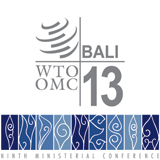Dear colleague,
From 3-6 December the WTO's 159 Member governments will be in Bali attending the most important meeting our organization has held in many, many years. The coming days may well shape the future of the WTO and the global trading system. At this stage the outcome of the meeting is very much in question.
The Bali package offers a huge amount, but the issues involved can be complicated, even for the experts. You will have your work cut out for you as you try and understand these texts. My team of press officers will be at your service to help you come to grips with these complex subjects. Let me try to help too by summarising briefly the issues on the table at MC9. The package includes:
- Measures on “Trade Facilitation” to streamline customs procedures and minimize unnecessary border delays, delivering jobs and opportunities in times of unemployment and slow growth. These simple steps are estimated to be worth up to $1 trillion per year for the global economy. The package would also deliver technical assistance in this area to support the better integration of developing and least-developed countries (LDCs) into the global economy. The concept of technical assistance to support developing countries and LDCs to implement WTO agreements is new and potentially very significant.
- Specific measures to support the LDCs, such as: improvements in duty-free-quota-free market access schemes; simplified and more accessible rules of origin for their exports; improved market access for the services sector: and a renewed push for negotiations on cotton.
- A mechanism for the review and strengthening of special and differential treatment provisions (which are vital for developing countries and LDCs) in all WTO agreements.
- Some very significant agricultural issues which would: set us on track for a reform of export subsidies and measures of similar effect; provide for a better implementation of tariff rate quota commitments; and provide a temporary shelter for food security programs while also putting in place negotiations that would address concerns regarding the sustainability of legitimate food security and food aid programs.
A successful meeting would therefore bring significant gains. Conversely, a setback would have profoundly negative consequences. It would sacrifice all this and it would compromise the ability of the WTO to negotiate future agreements.
It's no secret that governments have been exploring other channels for liberalizing trade. These are positive initiatives, but they offer no substitute for global agreements and global rules. Regional or plurilateral agreements by definition are exclusive and the countries most often excluded from these pacts are the poorest and weakest. If we fail in Bali we would not just be failing the business community, we would also be failing the most vulnerable among us.
As many of you are aware, we have been working very hard in Geneva to close gaps between countries and find common ground. Hundreds of hours of work in meetings involving all WTO Members brought us very close to success, but were not able to cross the finish line. At the General Council on 26 November I listened very closely to the Membership and what I heard was encouraging. Virtually all WTO Members said we have come too far and worked too hard to let the package fail. I heard many suggestions and I have given consideration to them all.
What struck me most however, was the passion that was shown by all sides. The LDC Group, the African Group and the African, Caribbean and Pacific Group were unequivocal in that we should not let a potential deal, one that offers real development opportunities now and in the future, wither and die. These are countries for which the WTO represents the best chance at integration into the global economy. But the developed countries were just as positive and just as vocal. It is clear that this package is not about developed versus developing countries – it is about all countries working together for mutual benefit.
In recent days, Members have been working hard to find solutions and I have been engaging with Ministers to discuss the best way forward. Again, I have heard a strong desire to keep going. I think there is wide acknowledgement that traditional negotiating routes cannot take us any further. The remaining gaps that separate the different positions are bridgeable. Nothing that is on the table requires any Member to go beyond what is doable. If ministers want a deal, it is quite possible. What we need is political will.
There is much to do and only days in which to do it. The challenge before Members is considerable, let us hope they rise to it.
Yours sincerely,
Roberto Azevêdo
